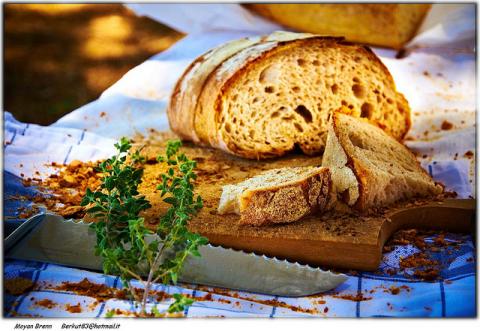
Taste and see that the Lord is good.
Today’s readings are invitations to reflect on wisdom in our lives and the centrality of Jesus as the source of life, the source of God’s love. While it may seem that the times of Jesus were simpler than ours, political, ethnic and economic tensions were as real and complex as those we face today. In Ephesians, Paul says “the days are evil” and that we must “make the most of the time.” These readings call us to reflect on our opportunities to fully live the love Jesus embodied.
In the reading from Proverbs, Wisdom invites us to a “meal”: “You that are simple, turn in here!” These words almost predict Paul’s exhortation to live “not as unwise people but as wise.” Then, Jesus invites everyone to eat the “bread that came down from heaven … Those who eat my flesh and drink my blood have eternal life …”
Meals are a theme throughout the New Testament – meals for thousands, among family and friends, wedding feasts and the last supper – all have the sharing of a meal as a central image in the story. The meal is an opportunity to share words, stories and most importantly, to share life-giving food – a communal effort to nourish life and spirit. In the Wisdom reading, the invitation is sent from the heights out over the city, so important is this invitation for all to share in God’s plenty.
But the Gospel reading challenges us to move beyond the physical images presented here, the image of eating Jesus’ flesh, drinking his blood (the word for eat comes from the classical Greek verb that means to gnaw or munch, not polite eating with your mouth closed). The Gospel reading invites us to live fully – in the every-day messes and difficulties of problems, anxieties, fears, by embodying the life of Jesus. We are called to fully participate in finding eternal life, to actively ingest, incorporate (take into ourselves bodily) the essence of Jesus: love for God and love for each other.
To be a bodily version of Jesus today means more than preparing napkins and silverware; it requires us to invite everyone to the feast to share what we have, at a time when we are confronted by many challenges. Today we are confronted with a distressing economy where neighbors are losing their jobs and their homes; the limits of natural resources and the visible impact of human overuse of these resources; the ravages of war and what they bring to bear on civilians in war-torn countries and our own military personnel; the huge disparity between the amount of money we spend on weapons compared to what we spend on health care or sustainable living for all of God’s people.
In many of our mission regions, the effects of global warming and climate change are already experienced through drought, water shortages and diminished crops. While this has a direct impact on the nutrition, health and economic wellbeing of local families, what we have not seen diminish is how generously people respond to their neighbors’ needs. Though my work in the area of global HIV and AIDS I visited mothers and fathers living with AIDS raising nieces, nephews and/or grandchildren. I have seen neighbors reach out to care for others, while they themselves have little income or means of support.
These are overwhelming issues, and the temptation is to leave them to our legislators or assume that we are not really responsible for them. But eating the flesh and blood of Jesus means living with compassion and understanding and using less so that there is more for others; it means seeking and following the paths of justice, openly denouncing war and violence and actively looking for ways to create peace; it means taking risks by embodying the essence of Jesus.
The focus that Jesus has throughout the gospel on meals and food is critical to our faith and work. Clearly to make Jesus alive in us today, to embody his essence of love, we must examine how all people can “taste and see that the Lord is good.” All must have a place at the table; all must have access to food and to the goodness God intended for all to experience in their daily lives.
A good friend asked me, “Do you love your life?” This simple question has really made me think: Do I love the life I live today? Do I live foolishly as was brought out in today’s reading from Proverbs; or, do I watch carefully how I live, not as a foolish person but as a wise one as Paul states in Ephesians? And more importantly can I look back at my day and know that my decisions, words and actions reflect the love for God and neighbor that were the basis of all of Jesus’ teachings? Does my life today reflect how I want eternal life to be? These are questions I leave with you today.
This reflection was originally published in 2009.
Photo copyright by Moyan Brenn
